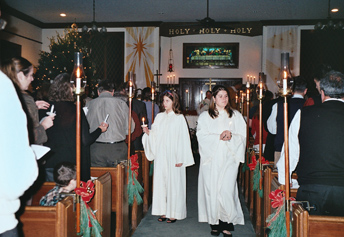|
Church History
Zion United Lutheran Church, founded in 1861, has a rich history. A record dated April 1, 1856 tells the early history of Zion's Church, Brodheadsville: "Having felt the necessity of having a more convenient place of worship, in or around the vicinity of Brodheadsville, for the benefit of the surrounding neighborhood, some of us thought proper in order to effect the object, to present a list of subscriptions to the neighborhood; to find out whether the necessary sum can be raised, which is required to erect a house. The subscribers will keep in mind that this list is conditional - should the necessary sum get subscribed, that it should be considered collectible. The subscription shall be paid in three payments: The first payment shall be due in two t=weeks after the work is begun; the second, when under roof; and the third, two weeks before the building is finished. We, the subscribers, do under the above consideration promise to pay the sum annexed to our names to erect a German Reformed and Lutheran Church on Gravel Hill." The names of 100 subscribers and their pledge amounts ranging from $1.00 to $50.00 each and with a combined total of $825.00. "Later, others subscribed bringing the total number of subscribers to 349 persons, and the total subscriptions to the sum of $2410.15. However, only $2095.45 had been paid at the time of the dedication. The total cost of the church was $2850.69 The lot on which the church was built, purchased and valued at $60.00, was cut out of a corner of Rudolph Weiss's farm. Mr. Weiss donated the land as his share of the enterprise. He also served as a member of the building committee. The actual work of building the church was started in the spring of 1861, at which time the cornerstone was laid by the Rev. George Greenwald, a Lutheran minister from Easton. The other ministers present were the Rev. Henry Seifert, the Rev. Charles Becker, and the Rev. George B. Dechant. The building committee was composed of Charles D. Brodhead, Rudolph Weiss, and Harrison Snyder. The building was planned locally and local carpenters, masons, and laborers were employed. It is interesting to note the amount of pay they received. Masons received one dollar per day, carpenters ninety cents, and laborers sixty to seventy-five cents. Each workman was allowed thirty cents a day in addition to his wages for board. Some of the men boarded with neighbors and were provided with excellent meals at ten cents per meal.
History of the ELCA The Evangelical Lutheran Church in America was formed over 20 years ago. This new church was formed from three separate and well-established North American church bodies:
Beginning January 1, 1988, these churches, with shared beliefs and missions, officially formed the ELCA. Two decades later, this energized church is composed of 4.8 million members and nearly 10,500 congregations across the U.S. and Caribbean. Today, the ELCA reflects the rich and diverse heritage of the people it serves.
But to understand our heritage fully, one must trace our roots back through the mid-17th century, when early Lutherans came to America from Europe, settling in the Virgin Islands and the area that is now known as New York. Even before that, Martin Luther sought reform for the church in the 16th century, laying the framework for our beliefs. Read about Lutheran Roots in America on the ELCA website >>
|
April 20, 2024 Worship Schedule Join us. for worship on facebook! Masks are optional. UPCOMING EVENTS Free Community Dinner - Drive-Thru 570.992.6988
Join Us! You're invited to join us in worship online on our facebook page.
What is the ELCA? Find out about the Evangelical Lutheran Church in America and the history of this wonderful organization on our What is ELCA page.
Members Login |

 History of Our Church
History of Our Church 